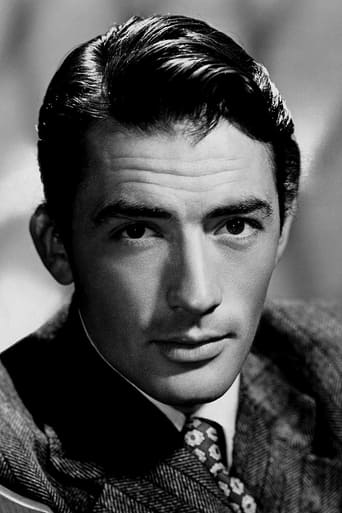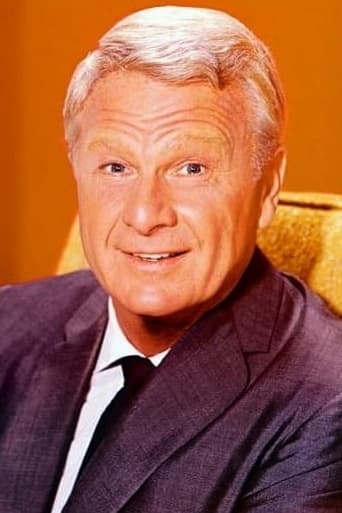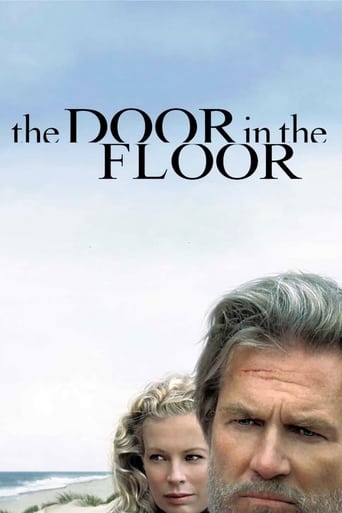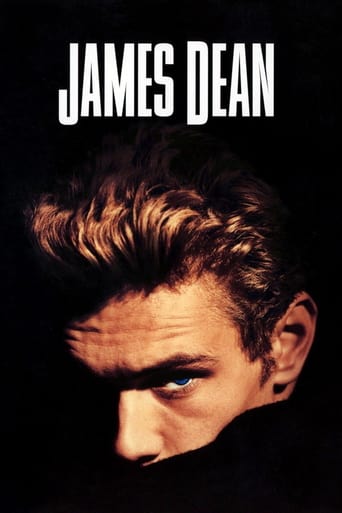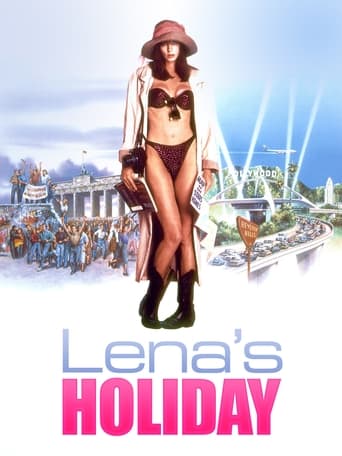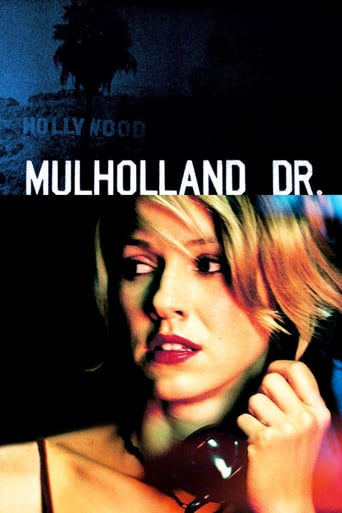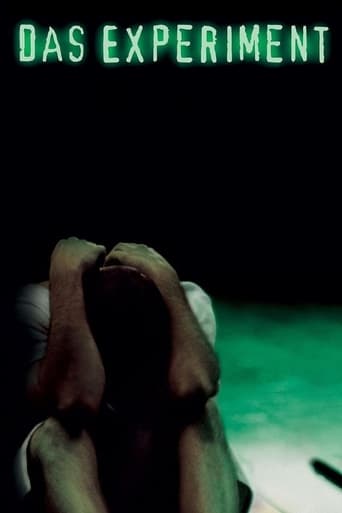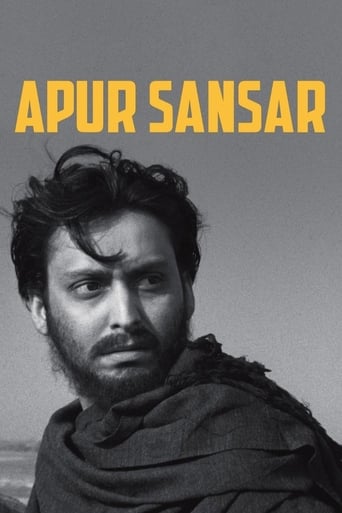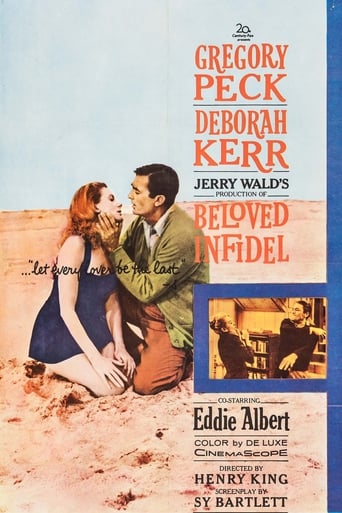
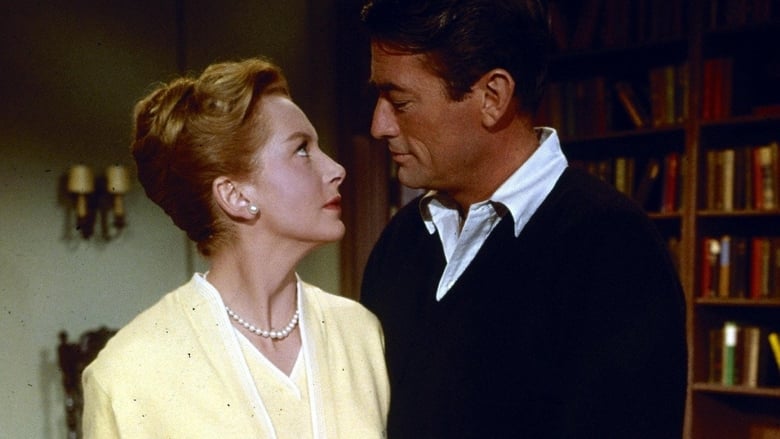
Beloved Infidel (1959)
Toward the end of his life F. Scott Fitzgerald is writing for Hollywood studios to be able to afford the cost of an asylum for his wife. He is also struggling against alcoholism. Into his life comes the famous gossip columnist.
Watch Trailer
Cast
Similar titles
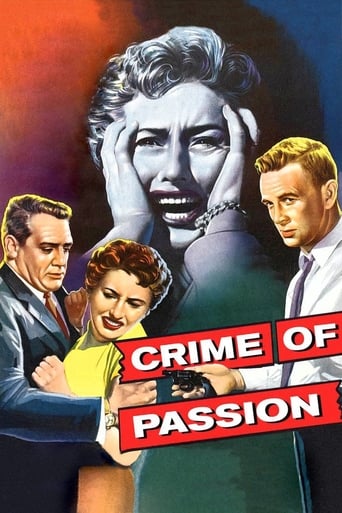


Reviews
If you don't like this, we can't be friends.
Good concept, poorly executed.
Did you people see the same film I saw?
There is, somehow, an interesting story here, as well as some good acting. There are also some good scenes
It is rather strange that the story of the great American novelist, F. Scott Fitzgerald (Gregory Peck), ends up being told, here, by the transplanted American gossip columnist, Sheilah Graham (Deborah Kerr). But, however melodramatic this picture may come off, we must remember that it is HER story--not his. His full life story is referred to, here, more in retrospect, but his struggle with alcohol is well documented.I find that great film scores often elevate a movie, and the score by Franz Waxman does wonders here. This was the era of great film scores, scores that often outlasted the overall effect of the movie. This is one of 3 movies in which Gregory Peck and Eddie Albert co-star, so this combination must have worked for both of them.
Deborah Kerr and Gregory Peck are Sheilah Graham and F. Scott Fitzgerald in "Beloved Infidel," based on Sheilah Graham's autobiography. 20th Century Fox gave this a big, glossy production, with Henry King as director.In the movie, Sheilah goes to the set of In Old Chicago with one "Mr. Harris" (Zanuck) and we see an actual scene from the film re-enacted. Graham has apparently criticized the actress Jane Pierce (Alice Faye) and Miss Pierce isn't happy to see her. In the cafeteria, there is a large photo of Shirley Temple, and next to her is Tyrone Power. Yes, we're at Fox, all right.Graham is an aspiring writer looking for work, and at a party, she meets F. Scott Fitzgerald, who has come out to Hollywood and is writing screenplays. The two fall in love. Zelda, Scott's wife, has been institutionalized by then, and his daughter Francis is in school. Fitzgerald needs the film work to pay his bills.History tells us that Fitzgerald was a big flop writing for movies; most of his work is uncredited or just not used. His glorious prose did not translate to the screen. In this version of his story, he starts drinking heavily after he is fired from the studio. In reality he had been an alcoholic since college. The alcohol temporarily breaks them up.Certainly one of the most fascinating people who ever lived is F. Scott Fitzgerald, and Sheilah Graham pulled herself up from nothing to become an important columnist. But neither of these people come off as especially fascinating or interesting.For me, Gregory Peck was miscast as Fitzgerald, whom I believe was, for one thing, much less robust, had a weaker character, and was probably drunk most of the time. Peck does as well as he can, but I think he was smart enough to know there was no way he could convey the personality of the real Fitzgerald. It wasn't in the script. Deborah Kerr, in my opinion, was an underrated actress, and she gives a marvelous performance here. But she probably wasn't playing Sheilah Graham.The script simply isn't specific or detailed enough to give us an idea of who these people really were.People have speculated how much of this story is true. Most of it - Fitzgerald did move to Hollywood, he did flop out in movies, he did fall for Sheilah Graham, they did live together, he did start to write The Last Tycoon; the incident toward the end of the movie at the theater did happen, and the end of the film was basically correct. As far as what they were both like -- you'll have to find another source for that.
One of the quirks of the English language is that although the words "infidel" and "infidelity" both derive from the same Latin root, meaning "unfaithful", they normally have differing meanings in English. "Infidelity" generally refers to adultery or sexual unfaithfulness, whereas an "infidel" normally means someone who does not believe in the tenets of a particular religion. It would be unusual, to say the least, to use the word "infidelity" to mean religious unbelief or to call an adulterer an "infidel". This film, however, is not concerned with the religious beliefs, or lack of them, of its main character, the writer F. Scott Fitzgerald. (He was raised as a Catholic but does not appear to have been a particularly devout one in adult life). I can only therefore assume that the title refers to his infidelity to his wife, Zelda.When I heard that the film was based on the life of Fitzgerald, I assumed that it would be about his wild and tempestuous life with Zelda during the twenties and early thirties. Instead, it concentrates on the last few years of his life, the period 1937 to 1940, and his relationship with his mistress, the journalist and gossip columnist Sheilah Graham. Indeed, Zelda does not appear in the film, although she is referred to. By 1937 Zelda was suffering from mental illness and was confined to a psychiatric hospital, but she and Scott were still married. Indeed, the two were never to divorce, and she legally remained his wife until his death.The main problem with the film is that of miscasting. Gregory Peck's most frequent screen image was that of an authoritative, rational and gentlemanly figure, so he does not really seem a natural choice to play a notorious hell-raiser like Fitzgerald. Peck occasionally succeeded in his efforts to break away from his normal persona, as in "Duel in the Sun", "The Boys from Brazil" or "Moby Dick" in which he made a notable Captain Ahab, but in several other films attempts to cast him against type fell flat. A good example is "Macarthur" from the latter part of his career, in which he never succeeded in capturing General Macarthur's aggressive, combative personality. In the initial part of this film Peck portrays Fitzgerald as yet another quiet, charming gentleman, and his portrayal is certainly convincing, although I did find myself wondering how close it was to the real Scott Fitzgerald. His past struggles against alcoholism are referred to, but for a while it seems as though he has conquered his addiction. Midway through the film, however, Fitzgerald falls off the wagon after he is sacked from his job as a Hollywood scriptwriter, and Peck is much less convincing as a violent, abusive drunk than he is as a gentlemanly intellectual. For a film made in the 1950s, with the Production Code still in force, this one is remarkably sympathetic in its treatment of adultery. Sheilah Graham is very much the heroine of the film, not its villain. (That is perhaps not surprising given that the film was based on her own memoirs. Fitzgerald had died in 1940 but Graham was still very much alive in 1959). She is portrayed as a kindly and understanding lover, patiently trying to help Scott deal with his problems, rather than as the heartless seductress which during this period was the standard cinematic image of women sexually involved with another woman's husband. Deborah Kerr was one of the screen's most famous "good girls", although she also had the ability to portray characters who hid passionate natures beneath a quiet, reserved surface, such as Karen, the adulterous Army wife in "From Here to Eternity", the troubled Sister Clodagh in "Black Narcissus", the haunted governess in "The Innocents" or another haunted governess, Miss Madrigal in "The Chalk Garden", in that case haunted by guilt rather than by anything supernatural. In "Beloved Infidel", however, Kerr seemed unable to draw upon this ability, and her Sheilah comes across as a character who is all surface with nothing much going on underneath. Kerr also fails to make the most of another aspect of her character, the toughness and determination which enabled her to rise from poverty in Britain to become one of the most famous women in America. There are some good things about this film- the script is a good one and it is attractively photographed. For a film of its period it has touches of originality, breaking away from the traditional "eternal triangle" concept of marital infidelity, a triangle composed of a weak, erring husband, a saintly, long-suffering wife and a wicked other woman. (This concept was not confined to the fifties, or even to the Production Code era; "Fatal Attraction" is a good example from the late eighties, and examples can still be found today). I felt, however, that it might have been better had alternative actors been found for the two leading roles. 6/10
Based on a self-serving novel by one-time girl friend and groupie of F. Scott Fitzgerald, gossip columnist Sheila Graham wrote this trashy story. Gregory Peck carries on in shameless excess as a forceful be-drunk-or-be-damned alcoholic; in contradiction to the gentle and soft spoken real Scott Fitzgerald. Focusing on Fitzgerald's Hollywood writing era, late in his life, the much-honored author was, in fact, living a quiet life and effectively fighting his alcoholism at a time when AA was not yet well known. Fitzgerald was none-too-proud to be recycling his flapper stories in order to support both his wife (in a mental hospital) and his daughter (in college). Living in a small apartment and driving a second hand Chevrolet his life was 180 degrees different than as portrayed in this movie.Virtually every 20th Century-Fox movie made during Daryll F. Zanuck's leadership, as well as virtually every film directed by Henry King, was a work of excellence. Beloved Infidel was the exception.
